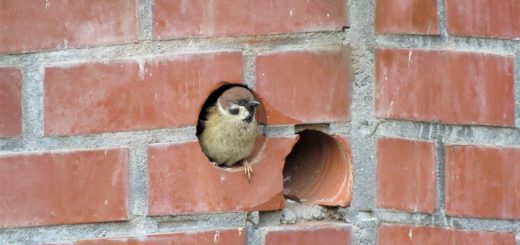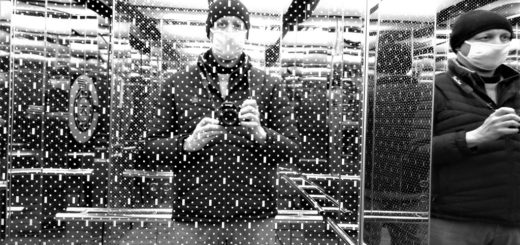Social Distancing
Regular readers may have noticed that I am writing very little these days concerning The Pandemic That Ate a Planet. Living in Korea, which was the first epicenter of the outbreak outside of Wuhan, China, back in February 2020, I hit the ground running on this coronavirus debacle and its political exploitations right at the outset, and then maintained a consistent stream of logical and factual discussion throughout the first year of the pandemic. Recently, however, I have largely avoided the topic, or at least broached it only indirectly, tangentially, and in ways that open out on wider themes. For those curious as to what has changed, or even disappointed that I have gone off the topic, perhaps I should offer an explanation. In fact, the reason is quite simple: I have decided that social distancing is the best answer after all.
I am therefore socially distancing myself from the folly of arguing with brick walls. I am socially distancing myself, likewise, from the arena of echo chamber gratifications, in the sense of merely saying what some readers desire to hear for the sake of pleasantly reinforcing their own opinions.
Distance is a standard image used in theoretical and psychological discourse to denote objectivity and understanding, regarding both one’s own mind and the world of one’s experience. We commonly speak of “getting a proper distance on” things, or looking at issues from “a critical distance,” or “stepping back from” a situation in order to “see it more clearly.” This sense of distance relates primarily to context, which, as I have frequently argued, is a large part of what knowledge entails. To step back is to see a thing (or oneself) in a wider picture, and thereby to understand it in its real proportions, and in its true relations. Hence, for example, I have spent a good deal of effort over the past year researching and then relating my findings concerning this ongoing pandemic in relation to history’s major global pandemics, particularly the 1918 influenza outbreak colloquially (but inaccurately) dubbed “Spanish flu.” I have also read academic medical research on the seasonal flu and its typical death toll, again in an attempt to see this past year’s coronavirus deaths against the backdrop of the estimated half-million flu deaths suffered on this planet every year.
Time is also a form of distance, of course. From the perspective of elapsed time, we may see things that were somewhat less apparent to us when swept up in the immediacy of a first encounter. And it is this temporal form of distance that has most affected me of late, with respect to the subject of The Pandemic That Ate a Planet. A year has passed. The pandemic has proceeded more or less as I imagined, and as I repeatedly predicted in writing — and that is true with regard to both the severity of the disease itself and (even more accurately) the severity of the global progressive power lunge occasioned by it.
At the end of a year, the global death numbers from COVID-19, tallied and padded in real time more earnestly than has ever been done with any previous virus outbreak, nevertheless reveal this pandemic — as a health issue — to have amounted to a relatively minor strain on ordinary human life, economic activity, and social stability.
At the end of a year, the futility, and even counterproductivity, of lockdowns and coerced social distancing — as public health policy — could not be more obvious. There is not one shred of evidence, anecdotal or scientific, to support the premise that lockdowns have saved lives or prevented the spread of this coronavirus in any way whatsoever — for exactly the reason I expressed in the earliest weeks, when Italy instituted the first such lockdown, namely that the very perception of the “need” for a lockdown indicates that the virus has already spread so widely in that community that shutting down social life could accomplish nothing but secondary harm, in addition to the prolongation of the inevitable with regard to the strictly health-related effects.
At the end of a year, it is self-evident to anyone who chooses to walk through life with his eyes open that this pandemic — by which I mean the virus itself — has caused no widespread economic damage or societal breakdown, because it has caused no significant wave of death or critical illness among the world’s productive populations.
At the end of a year, we have all seen millions of elderly people deprived of regular visits, shared holiday meals, and the comforting presence of generations of loved ones for what might be the last good months of their lives, due to police state restrictions on family affection; and untold numbers of emotionally fragile people, young and old, pushed to hopelessness and suicide by the combination of forced isolation and the general environment of despair and panic that has enveloped their lives.
At the end of a year, we have all walked through streets that were previously bustling with life amid privately-owned shops, cafés, and restaurants, but which are now becoming ghost towns of shuttered windows and gutted storefronts, so many thousands of people, from small business owners to part-time student workers, deprived of their livelihoods or their life-savings investments by government fiat, while the major corporations that fill the politicians’ coffers thrive on the coerced absence of competition from the now-decimated “little guy” — the real economic meaning of “social democracy” in practice, now as always.
In short, at the end of this first full year of COVID-19, we can all see the truths staring us so plainly in the face:
This is not a major global health crisis, but a major global political crisis.
The vast majority of the human population has been reduced to such levels of irrational manipulability and fundamental cowardice that there is no longer anything the state and its media accomplices could not successfully foist upon that majority with the bare minimum of fearmongering aimed at the pettiest self-interest.
And this is the point: we can all see it. It is too obvious not to be apparent to anyone who chooses to look, which is to say anyone whose vision is not effectively filtered through propaganda and public policy so blatantly out of proportion with the world he is actually living in that his mind has clearly been reduced by a lifetime of state-induced ignorance and fear to nothing but a passive receptacle for authoritarian interpretations of reality.
Such people — and remember, we are talking about the vast majority of our neighbors, everywhere — are living in a condition far more stifling of self-understanding and logical inquiry than even the prisoners in Plato’s cave, who are tied in their chairs, heads immobilized, and constrained to stare only at shadows cast upon the back wall of the cave, which shadows they inevitably mistake for the real world. In today’s cave, the prisoners are the shadows themselves, deprived even of the psychological reality of their own existence as perceivers. They themselves are two-dimensional dancing images cast on the wall of life by the cut-out caricatures of men to which their souls have been diminished by compulsory schooling and a lifetime of state-corporate indoctrination to mindlessness and moral dependency.
I have run out of patience for looking at those human shadows. In fact, I can hardly see them in such dimness. Why, then, should I continue the folly of “debating” with them? I have made my points about this pandemic. I have seen my warnings and predictions realized on so many levels. I have watched almost everyone around me, locally and globally, carry on quivering and panicking, month after non-cataclysmic month, apparently unperturbed by the ever-increasing transparency of the falsehoods they have been sold.
I have a personal motto, simple-sounding but layered with implications, which I frequently recite to university students seeking guidance about how to focus their own lives more reasonably: I don’t waste time. That motto is in my mind these days every time I feel tempted to get into the weeds on this pandemic. Yes, we have been enslaved. It would be more accurate to say we have been exposed. And no, this is neither a short-term problem nor one susceptible to electoral corrections. I choose to accept that reality, and work on rising above it — not erasing it, but overcoming it — in the only way possible.
The shadow people dancing on the wall can lament amongst themselves. They only hear one voice in the end, anyway.



